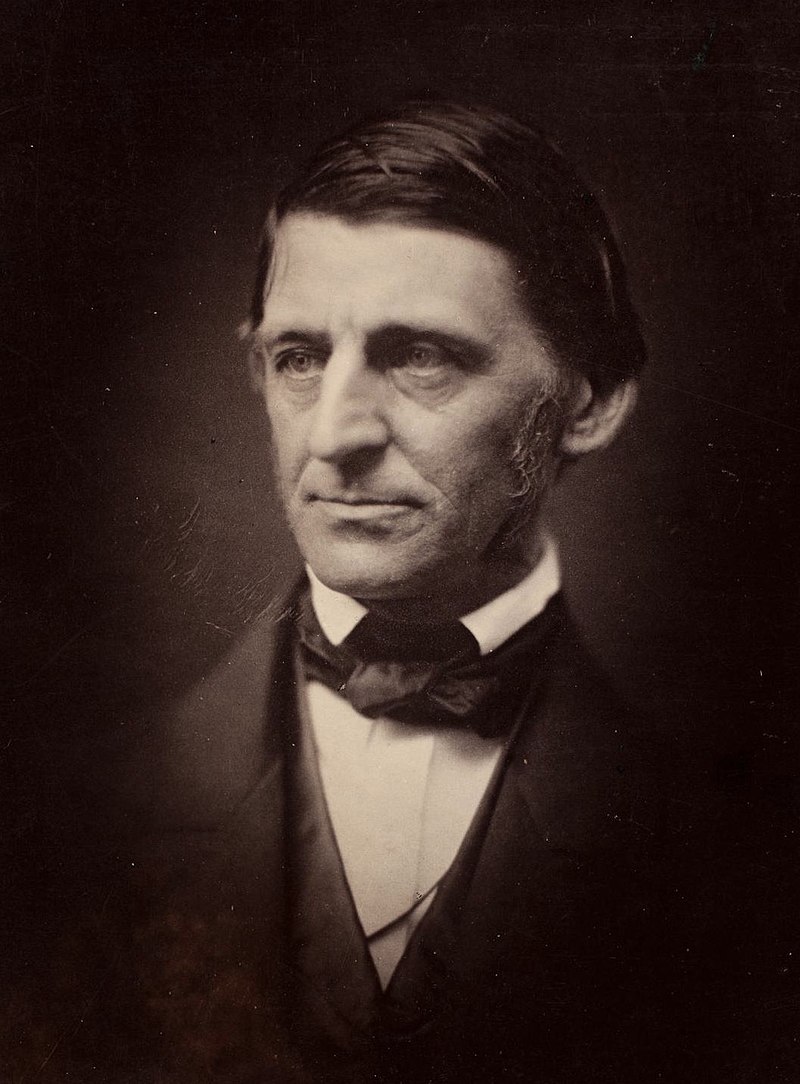By: Ken Morgan
In the 1970s and 1980s, I started to study different religions and self-help books. One question I was asked many times was, “Have you studied Emerson?” It happened so often that one day, I went out and bought a book of complete writings of Emerson to see what the noise was all about. Since then, Emerson’s writings (and Hermetics/Deism) have been at the center of my thoughts. Of course, when studying Emerson, you will also run into another great writer – Henry David Thoreau, a friend of Emerson. Early on in their friendship, Emerson mentored Thoreau. If you get the chance, read Walden by Thoreau. He has a more critical view of society than Emerson and could be more optimistic. He has valuable insight for anyone willing to study his writings.
Ralph Waldo Emerson, an American Transcendentalist, may seem like a relic of the 19th century. Yet, his thoughts on individuality, Nature, and truth resonate surprisingly well in our era of selfies, self-help gurus, and information overload. With Emerson’s ideas, we can unlock their potential to enrich our lives in science, self-improvement, and the broader social sphere.
From Self-Improvement to Self-Reliance: In an age of self-help books and seminars promising instant happiness, Emerson offers a more profound path to growth. His concept of “self-reliance” goes beyond tips and tricks, urging us to develop our inner resources and critical thinking. Instead of passively consuming self-help advice, Emerson encourages us to question, explore, and trust our judgment. This empowers us to identify actual needs, find authentic solutions, and build lasting resilience in a world obsessed with quick fixes.
Science and the Unsung Role of Intuition: While seemingly at odds with science’s emphasis on empirical evidence, Emerson’s focus on intuition can complement scientific inquiry. He valued Nature as a source of inspiration and revelation, arguing, “The highest truth … is not discoverable by the analysis but by the synthesis.” This resonates with the growing recognition of intuition as a valuable tool in scientific discovery, where hunches and seemingly “irrational” leaps often lead to breakthroughs. We can foster a more holistic approach to scientific exploration by embracing logic and intuition.
Connecting with Nature in our Digital Age: Our hyper-connected world often leaves us disconnected from the natural world. Emerson, however, saw Nature as a wellspring of creativity, wisdom, and spiritual renewal. He urged people to immerse themselves in its beauty and power, finding inspiration and perspective beyond the world’s trappings; an example would be today’s digital screen. He thought experiencing nature firsthand could boost mental and physical well-being, foster creativity, reduce stress, and remind us of our place in the larger ecosystem.
Questioning Authority and Finding Truth: The digital age presents a deluge of information, often biased and manipulated. A keen observer of societal trends, Emerson championed individual thought and critical inquiry. He encouraged us to question authority, scrutinize information, and seek truth. This is especially crucial in the age of “fake news” and echo chambers. By applying Emerson’s principles of intellectual curiosity and skepticism, we can become discerning consumers of information, challenge biases, and develop informed opinions in a world where truth is often contested.
Beyond Egotism: Individuality and Social Responsibility: Although sometimes misinterpreted as narcissism, Emerson’s focus on individuality does not advocate self-absorbed isolation. He believed that individual growth led to a deeper understanding of oneself and, consequently, of humanity. This self-awareness fostered compassion and a sense of responsibility towards others. In our increasingly polarized world, Emerson’s message of authentic individualism encourages us to engage in constructive dialogue, bridge divides, and contribute to a more just and equitable society.
From Words to Action: Embracing the Emersonian Spirit: Engaging with Emerson’s ideas requires more than intellectual understanding. It necessitates active exploration and experimentation.
By studying Emerson’s writings, we can:
- Seek solitude and reflection: Emerson valued periods of introspection, away from the noise of daily life. Spending time in Nature or quiet spaces can spark self-discovery and creative thinking.
- Engage in critical thinking: Question assumptions, explore diverse perspectives, and challenge our biases. This enhances our ability to analyze information and arrive at informed conclusions.
- Connect with Nature: Regularly immerse ourselves in natural environments, appreciating their beauty and learning from their interconnectedness.
- Develop personal passions: Pursue intellectual curiosity, explore the arts, and cultivate interests beyond the mundane.
- Contribute to the greater good: Using our self-awareness and understanding to work towards building a better world.
While historical contexts and perspectives evolve, the essence of Emerson’s message – self-reliance, intellectual curiosity, and connection with Nature – remains undeniably relevant and valuable in our world.
Explore the wonders of Nature and engage with Emerson’s ideas. My favorite is his Compensation essay. Another of his essays may fit what you are looking for. Give Emerson’s writings a try. You might be surprised at how this long-dead thinker can illuminate your path in a world increasingly hungry for genuine insight and meaningful connection. I use his ideas every day, often without even being aware that my study of Emerson has influenced my thoughts.





